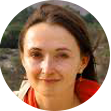Team
Director
 Justyna Olko, Ph.D.
Justyna Olko, Ph.D.
Justyna Olko – historian, Deputy Dean for Young Academic Staff at the Faculty of “Artes Liberales” at the University of Warsaw. She obtained a doctoral degree in the humanities in 2005 at the UW’s Faculty of History for a dissertation on the attributes and iconography of power among the Aztec/Nahua elites. She specializes in the ethnohistory and anthropology of pre-Hispanic and colonial Mesoamerica, with a special focus on Nahua culture; she is also involved in a program for revitalizing the Nahuatl language in Mexico and Wymysorys in Poland. Author of several books, including Turquoise Diadems and Staffs of Of fice. Insignia of Power in Aztec and Early Colonial Mexico (University of Warsaw, 2005), Meksyk przed konkwistą [Mexico before the Conquest] (PIW, 2010, Klio Prize 2010) and Insignia of Rank in the Nahua World (University Press of Colorado, 2014). A recipient of scholarships from Dumbarton Oaks, John Carter Brown Library and of several major grants from European Research Council Starting Grant, Foundation for Polish Science, National Science Centre and the Ministry of Science and Higher Education. Awarded the Knight’s Cross of the Order of Polonia Restituta (2013) and a Burgen Fellowship by Academia Europaea (2013).
Team members
 John Sullivan, Ph.D.
John Sullivan, Ph.D.
John Sullivan is a research professor at the Universidad Autónoma de Zacatecas, director of the Zacatecas Institute for Teaching and Research in Ethnology (IDIEZ), visiting professor at the University of Warsaw, and director of the Nahuatl Program at Yale University. He has a doctorate in Literature from the University of California San Diego (1995) and was a Guggenheim Fellow in 2007. He currently works with the indigenous researchers at IDIEZ on the production of a monolingual dictionary of Modern Huastecan Nahuatl. He also participates in two projects: Europe and America in contact: a multidisciplinary study of cross-cultural transfer in the New World across time and Endangered languages. Comprehensive models for research and revitalization.
 Patrycja Prządka-Giersz, Ph.D.
Patrycja Prządka-Giersz, Ph.D.
Patrycja Prządka-Giersz is an archeologist, anthropologist and ethnohistorian. She specializes in archaeology and iconography of pre-Columbian cultures from Andean region, mainly from the northern coast of Peru, in the late period of pre-Hispanic times and the beginning of the Spanish conquest (900/1000-1533 AD). In 2009 she obtained a doctoral degree in the humanities at the UW’s Faculty of History with doctoral thesis on socio-cultural and settlement structure in the north-central coast of Peru in the last 500 years before the Spanish conquest (Patrones de asentamieniento y transformaciones sociopoliticas en la costa norcentral del Perú durante los Periodos Tardíos: el caso del valle de Culebras). Since 2002 she has directed the Archaeological Project Valle de Culebras on the north-central coast of Peru in collabroation with UW Pre-Columbian Research Center and the Pontifical Catholic University in Lima, financed from two grants of Research Committee in Poland.
 Bartłomiej Chromik, M.A.
Bartłomiej Chromik, M.A.
Bartłomiej Chromik is research assistant of the project “Endangered languages” and author of scholarly articles about Wilamowicean language. In 2010 he graduated from Warsaw School of Economics where he obtained Master’s degree in the field of Quantitative Methods in Economics and Information Systems. In 2012 he was awarded Master’s degree from the University of Warsaw’s Institute of Ethnology and Cultural Anthropology. Currently, he is a PhD candidate at the Faculty of “Artes Liberales”.
 Katarzyna Granicka, M.A.
Katarzyna Granicka, M.A.
Katarzyna Granicka is a Ph.D. student at the Faculty of “Artes Liberales” at the University of Warsaw. She graduated from the same Faculty with the Master thesis in which she analyzed the section of “veintenas” from the manuscript Primeros Memoriales. Currently she works on the evangelization of the indigenous people in Nahuatl during the early stages of language contact. Her doctoral thesis is concerned with the sixteenth-century doctrinal texts “Doctrina Christiana en Lengua Española y Mexicana”.
 Szymon Gruda, M.A.
Szymon Gruda, M.A.
Szymon Gruda is a Ph.D. student at the Faculty of “Artes Liberales” at the University of Warsaw and a graduate of the College of Interdepartamental Studies in the Humanities at the University of Warsaw. His research interests focus on linguistics, culture and literature of the Middle Ages and the early modern period, as well as language, culture and history of the prehispanic and modern Nahuas. His Ph.D. dissertation project is concerned with the oldest trilingual dictionary of Nahuatl, Spanish and Latin.
Collaborators in Spain
 Isabel Bueno Bravo, Ph.D.
Isabel Bueno Bravo, Ph.D.
Isabel Bueno Bravo is associated with Fundación Cátedra Iberoamericana at the University of the Baleary Islands in Spain. She is a specialist in preconquest and postconquest Mesoamerican ethnohistory, anthropology and art history. She has conducted extensive research on Mesoamerican war.
Collaborators in Mexico
Eduardo de la Cruz Cruz
Collaborators in Israel
 Jan Szemiński, Ph.D.
Jan Szemiński, Ph.D.
Jan Szemiński is a professor at the Department of Romance and Latin American Studies, Faculty of Humanities, at the Hebrew University of Jerusalem. He is an ethnohistorian interested in Inca ethnohistory, oral tradition and Quechua language as a historical source in the 6th-18th-century central Andes.